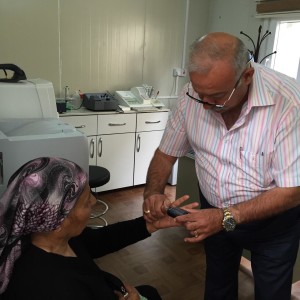 A patient receives treatment at Duhok Clinic in Iraq. The clinics are an effort of Detroit-based MERCI, a group of health professionals dedicated to helping Iraqi Christians and those displaced after the ISIS invasion of Mosul. (Courtesy of HelpIraq.org)
A patient receives treatment at Duhok Clinic in Iraq. The clinics are an effort of Detroit-based MERCI, a group of health professionals dedicated to helping Iraqi Christians and those displaced after the ISIS invasion of Mosul. (Courtesy of HelpIraq.org)SOUTHFIELD — In June 2014, Christians in Iraq were told to convert to Islam, leave their cities, or be killed. Those who chose to flee left suddenly and with little more than the clothes on their backs.
Rafed Yaldo, president of John Paul Home Care in Bingham Farms, wanted to do something to help the 150,000 refugees in need of medicine, food and supplies. Yaldo moved to the United States from Iraq at age 12.
“When ISIS first invaded Mosul, I immediately contacted the bishop,” said Yaldo, who is part of the St. Thomas the Apostle Chaldean Catholic Eparchy, the Chaldean diocese based in Southfiled and overseen by Bishop Francis Y. Kalabat. “He gave us the name ‘Help Iraq,’ and from there we formed several sub-groups to meet various needs, including medical, legal and educational.”
One of the groups is the Medical Emergency Relief for Christians of Iraq, or MERCI, a 501(c)(3) organization. Consisting of Detroit-area volunteer doctors, pharmacists, dentists, psychologists and other health professionals, the group was ready to help within 10 days of being asked. Many of the MERCI committee members belong to the Chaldean American Association for Health Professionals (CAAHP).
By phone and email, MERCI volunteers worked with doctors and clergy in Iraq to establish clinics for the refugees. Some clinics began in tents or in small rooms at Catholic churches; most eventually moved to larger structures. Today, MERCI sponsors 10 facilities that aid displaced civilians in Iraq. Clinics serve as many as 350 people each day, six days per week.
MERCI supports the clinics through monetary donations, shipments of supplies, and medical consulting. Doctors in the group offer expertise by phone to Iraqi doctors who volunteer at the health centers.
MERCI-sponsored clinics do not charge for services or medication and are open to everyone, regardless of race or religion, including Christians, Muslims and Yazidis.
Dr. Musib Gappy, an internal medicine physician, is president of the CAAHP and a MERCI member.
“The beauty of this effort is that it would not be possible without the Church,” Dr. Gappy said. “We have the blessing of Bishop Francis (Kalabat) and we work closely with bishops and priests in Iraq.”
Patients at the clinics are treated for a range of conditions, including chronic diseases such as high blood pressure or heart conditions requiring medication to control. Others struggle with depression and post-traumatic stress disorder (PTSD).
Last year, MERCI doctors and pharmacists helped a pregnant woman obtain treatment for a clotting disorder that likely would have ended her pregnancy with twins. Today the doctors proudly show pictures of the babies when they talk about their work in Iraq.
 Members of MERCI, Medical Emergency Relief for Christians of Iraqi, have helped thousands of displaced Christians at 10 clinics in Iraq since forming the group a year ago. (Karla Dorweiler, Special to The Michigan Catholic)
Members of MERCI, Medical Emergency Relief for Christians of Iraqi, have helped thousands of displaced Christians at 10 clinics in Iraq since forming the group a year ago. (Karla Dorweiler, Special to The Michigan Catholic)“This is a human crisis,” said MERCI dentist Nezih Bachuri, who has visited the clinics in Iraq. “People in the U.S. have the freedom to eat, drink, have fun, work. There, they cannot do any of these things. They have been in caravans for a year and aren’t able to do anything — they’ve lost basic human rights. There is no fresh water, no way to make money.”
To help pay for the cost of the clinics and the medications, MERCI relies on donations from individuals and other organizations or businesses. Funds are carefully documented to ensure transparency. Patients are given ID cards to track medications.
“I went to Iraq twice in 2014, and I can tell you firsthand that probably the biggest need there right now is the medical need,” said Yaldo. “They need medicine, supplies. They need things we don’t even think about on a daily basis. Feminine products are a major need because the women over there don’t have much of a voice. With so many other needs, that one often gets forgotten, and yet it’s so basic for women and their dignity.”
Nada Hana Bachuri, a MERCI volunteer and physician, says the call to help Iraqi Christians is urgent.
“We can’t wait for the governments or the U.N. The work has to be done from here,” Hana Bachuri said. “If we don’t put our hands together, nothing will be done and the future generation of Christian faith will be lost there.”
The group plans to continue to offer aid until the refugees are no longer displaced.
To make a donation or learn more about MERCI, visit www.merci.helpiraq.org. Supporters may make a one-time donation or be part of the “20 For MERCI” program, donating $20 per month.
Walk for Refugees
On Aug. 2, a walk-a-thon in Brighton will raise funds for displaced Iraqis. The walk begins at 10 a.m., followed by Mass at noon with Bishop Francis Kalabat and a family picnic. Cost is $25 for ages 15 and up and $15 for ages 14 and under. Email [email protected].









